
December 11, 2024
Representatives from the 26 NIEHS-funded Environmental Health Science (EHS) Core Centers gathered in Baltimore to discuss the evolving concept of the community exposome. The meeting brought together community members and scientists to share their diverse viewpoints on implementing exposomics, particularly as it relates to environmental justice and environmental health disparities.
- Science Highlights
- NIEHS Environmental Factor

September 10, 2024
The NIEHS-funded Environmental Health Sciences Core Center at the University of Iowa developed a podcast series and accompanying teaching resources around the topic of climate change. The series features researchers and government officials who discuss a range of climate topics relevant to communities in Iowa and beyond.
- News
- University of Iowa

August 28, 2024
The Pilot Projects Program of the NIEHS-funded Environmental Health Sciences Core Center at Mount Sinai reached a 10-year milestone in 2023. Over the past decade, the program has funded 94 pilot studies led by Mount Sinai postdoctoral fellows and junior faculty, many of which have gone on to receive larger grant awards.
- Career Development
- Mount Sinai EHS Core Center

August 12, 2024
Lariah Edwards, Ph.D., won the 2023 Rosalind Franklin Society Award in Science for the best research paper by a woman or underrepresented minority in science across more than 100 peer-reviewed journals. Funded by the NIEHS Environmental Health Sciences Core Center at Columbia University, the featured paper used a community-based participatory research approach to examine how beauty norms affected beauty product use among women and femme-identifying individuals in New York City.
“The success of this paper is owed to so many wonderful collaborators, with a special thanks to the community members who disseminated and completed this survey. I’m so pleased that everyone’s hard work is being recognized,” Edwards said.
- Awards
- Columbia University CEHNM

July 29, 2024
PFAS exposure in adult male mice resulted in abnormal sperm methylation and altered gene expression in offspring tissues important for metabolic health, according to researchers from the NIEHS-funded Environmental Health Sciences Core Center at Wayne State University. Study results suggest that PFAS exposure in males prior to offspring conception can negatively affect the health of the next generation, the scientists wrote.
- Publications
- Wayne State University

July 09, 2024
Researchers from the NIEHS-funded Environmental Health Sciences Core Center at the University of New Mexico (UNM) detected significant levels of microplastics in the testicular tissue of both humans and canines.- Publications
- UNM News
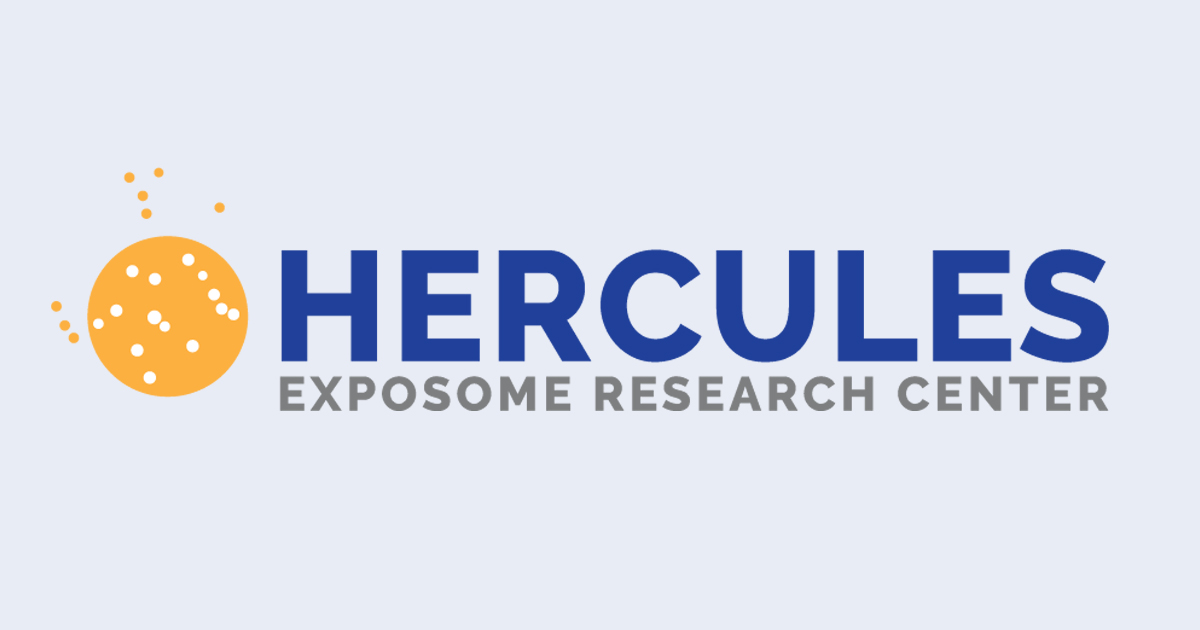
June 14, 2024
The NIEHS-funded HERCULES Center at Emory University was featured in a Rollins Magazine cover story for its role in advancing exposome research. The exposome is the sum of all environmental exposures and our body’s response to those exposures across the lifespan.
- Science Highlights
- HERCULES Exposome Research Center

May 07, 2024
Increased production of petrochemicals is linked to rising rates of cancer, diabetes, infertility, and other chronic health conditions, according to a review article authored by Tracey Woodruff, Ph.D., director of the NIEHS-funded Environmental Research and Translation for Health Center at the University of California, San Francisco.- Publications
- UCSF Environmental Research and Translation for Health Center
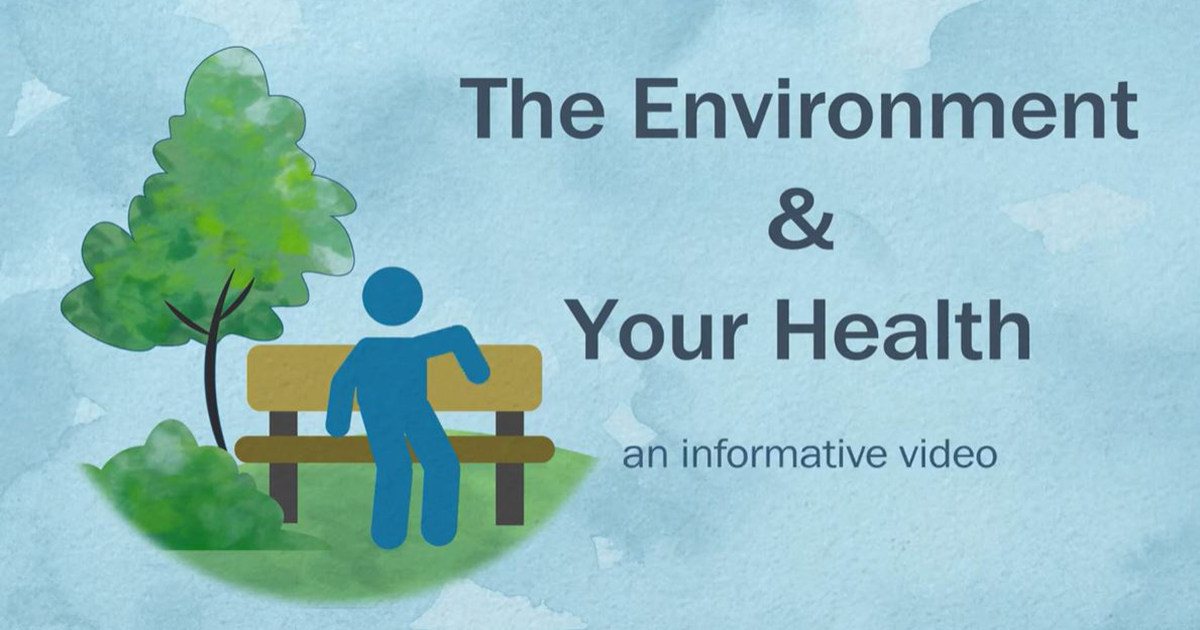
April 25, 2024
A video produced by the NIEHS-funded Environmental Health Sciences Core Center at Oregon State University provides an accessible way to introduce the field of environmental health to students and community members.- News
- EHS Core Centers
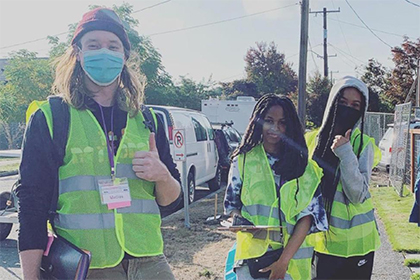
April 04, 2024
Researchers at the NIEHS-funded Environmental Health Sciences Core Center at the University of Washington conducted a survey with residents in Seattle’s Duwamish Valley to find out community priorities, strengths, and needs regarding climate change. The team published their findings in an online story map, and the information will advise actions to build climate resilience in the Duwamish Valley.- Community Engagement
- University of Washington EHS Core Center

March 25, 2024
Researchers from NIEHS Environmental Health Sciences (EHS) Core Centers stood out at the 2024 Society of Toxicology (SOT) conference, held March 10-14 in Salt Lake City, Utah.
- Awards
- EHS Core Centers
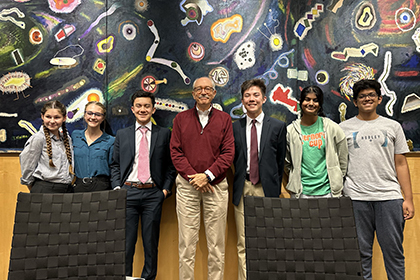
February 23, 2024
When a high school chemistry teacher in western Kentucky learned about PFAS-contaminated water in her community, she wanted to encourage her students to help address this local environmental health issue. She connected with the NIEHS-funded Environmental Health Sciences Core Center at the University of Louisville, and together they developed a research project for students to collect and test water samples for PFAS.- Science Highlights
- University of Louisville’s Center for Integrative Environmental Health Sciences

January 17, 2024
Scientists from the NIEHS-funded Environmental Health Sciences (EHS) Core Centers at Harvard and Columbia University are studying the factors that influence hair product use and how exposure to chemicals in these products may contribute to environmental health disparities among Black women.- Science Highlights
- Harvard and Columbia EHS Core Centers

December 08, 2023
Marilyn Howarth, M.D., discusses factors that contribute to high lead exposure in urban areas in an October 2023 NIEHS podcast. She also shares ways to reduce lead exposure at home and at the community level.Howarth directs Community Engagement Core within the University of Pennsylvania’s NIEHS-funded Center of Excellence in Environmental Toxicology.- News
- NIEHS Partnerships for Environmental Public Health
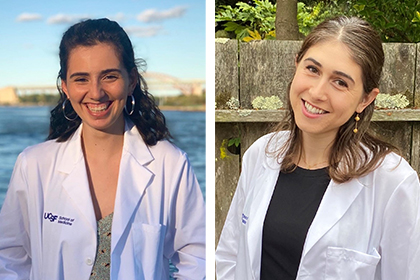
November 16, 2023
Healthcare professionals often feel unprepared to recognize and address how exposure to environmental contaminants affects patients’ health. To address this knowledge gap, the NIEHS-funded Environmental Health Sciences Core Center at the University of California, San Francisco created the Environmental Scholars Program. The program helps future doctors and nurses identify and treat health issues stemming from environmental exposures and a changing climate.The program helps doctors and nurses identify and address health issues stemming from environmental exposures and a changing climate.- Career Development
- University of California, San Francisco EHS Core Center

October 16, 2023
Researchers from the NIEHS-funded Environmental Health Science (EHS) Core Center at the University of Washington are collaborating with community partners to measure air pollution, study its health impacts, and test possible solutions to improve air quality. Their research runs the gamut, examining the health effects of air pollution in children and older adults as well as rural and urban populations.- Science Highlights
- University of Washington EHS Core Center

October 02, 2023
Women with certain cancers had higher levels of PFAS and phenol chemicals in their bodies compared to women without the disease, according to research published in the Journal of Exposure Science and Environmental Epidemiology. The study is the result of a collaboration among researchers from NIEHS-funded Environmental Health Sciences (EHS) Core Centers at the University of Southern California (USC), University of California, San Francisco (UCSF), and the University of Michigan.- Publications
- USC Keck School News

September 20, 2023
Researchers from the NIEHS-funded Environmental Health Sciences Center (EHSC) at the University of Rochester explore how exposure to environmental chemicals affects brain health. The scientists study how exposure to air pollution, pesticides, and PFAS may harm brain health across the life course – from disrupting early brain development to increasing Parkinson’s disease risk later in life.- Science Highlights
- University of Rochester EHSC

September 06, 2023
In a two-part installment of the Environmental Health Chat podcast series, researchers from the NIEHS-funded HERCULES Exposome Research Center discuss the exposome, a growing area of research that aims to assess all the environmental factors a person is exposed to throughout their life and how those exposures affect health. The first episode features HERCULES researcher Doug Walker, Ph.D. Part two features Melanie Pearson, Ph.D., who leads the HERCULES Community Engagement Core.- News
- NIEHS

August 01, 2023
As people age, their bodies may be less capable of handling the effects of environmental hazards, such as poor air quality. Researchers from NIEHS-funded Environmental Health Sciences Core Centers are studying how environmental exposures may adversely affect the health and well-being of older adults. Research results may help inform policies that can protect their health.- Science Highlights
- EHS Core Centers

July 26, 2023
Researchers from the Environmental Health Sciences Core Centers at Emory University and the University of Michigan collected and analyzed oral histories from people who experienced the aftermath of polybrominated biphenyl contamination in Michigan in 1973.- Community Engagement
- Partnerships for Environmental Public Health Newsletter
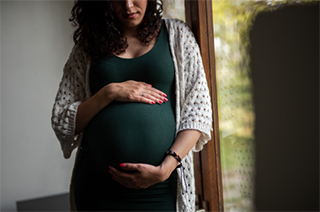
June 29, 2023
Exposure to per- and polyfluoroalkyl substances (PFAS) may reduce fertility in women by as much as 40%, researchers from the NIEHS-funded Environmental Health Sciences Core Center at Mount Sinai found. The team reported that higher levels of PFAS in blood were associated with a significant reduction in the likelihood of pregnancy and live birth among a group of reproductive-age women in Singapore who were trying to conceive.- Publications
- Mount Sinai EHS Core Center

June 01, 2023
When residents discover or suspect pollution is harming their community, the process of investigating and fixing the problem can be overwhelming. Working with communities dealing with contamination, members of the NIEHS-funded EHS Core Centers at the University of Cincinnati and the University of Pennsylvania developed an online resource to guide residents through the daunting environmental cleanup process.- Community Engagement
- EHS Core Centers

May 12, 2023
Tamarra James-Todd, Ph.D., of the Harvard University EHS Core Center, and Ami Zota, Ph.D., of the Columbia University EHS Core Center, are leaders in field of beauty justice, which addresses the health and exposure inequities related to chemicals in beauty and personal care products.- Science Highlights
- EHS Core Centers

April 28, 2023
The NIEHS-funded Environmental Health Sciences Core Center at the University of California, Davis released a documentary in January 2023 that describes workers’ quest to improve their health and safety within the household domestic service industry in California. The documentary,"Dignidad: Domestic Workers’ Journey for Justice in California,” features results from a report that describes how the COVID-19 pandemic affected these workers.- News
- NIEHS Partnerships for Environmental Public Health

April 14, 2023
Researchers from NIEHS Environmental Health Sciences (EHS) Core Centers were recognized for their contributions to scientific discovery, mentorship, and education at the 2023 Society of Toxicology (SOT) conference, held March 19-23 in Nashville, Tennessee. Acknowledged for their individual research and training endeavors, six Core Center scientists received awards at the conference.- Awards
- EHS Core Centers

April 13, 2023
In response to community concerns about water contamination from the Jones Road Superfund site, University of Texas Medical Branch researcher Lance Hallberg, Ph.D., is providing Houston residents the data they need to make informed decisions about their health. His research is supported through a pilot project award from the NIEHS-funded Gulf Coast Center for Precision Environmental Health.- Community Engagement
- Gulf Coast Center for Precision Environmental Health

March 22, 2023
When a car-shredding company announced plans to move to a southeast Chicago neighborhood, researchers from the NIEHS-funded ChicAgo Center for Health and EnvironmenT (CACHET) stepped in to address community concerns about air pollution emissions from the facility.- Community Engagement
- University of Illinois Chicago

March 08, 2023
Buildings renovated with furniture free of per- and polyfluoroalkyl substances (PFAS) had significantly lower levels of the chemicals in dust compared to buildings with conventional furnishings, according to NIEHS-funded researchers from the Harvard University Environmental Health Sciences Core Center (Core Center).- Publications
- Harvard University

February 24, 2023
For more than a decade, scientists from the NIEHS-funded Environmental Health Sciences Core Center at the University of Iowa have hosted informal gatherings called Science Cafés where the public can connect with scientists. Led by Center members Brandi Janssen, Ph.D., and Jackie Curnick, M.D.P., an evaluation of the events revealed that information shared at Science Cafés trickles out to the broader community via social networks.- Community Engagement
- University of Iowa

January 17, 2023
Having better access to primary health care may improve awareness and control of high blood pressure, according to research funded in part by NIEHS. The study was led by Brisa Aschebrook-Kilfoy, Ph.D., and Jiajun Luo, Ph.D., members of the NIEHS Environmental Health Sciences Core Center at the University of Chicago.- Publications
- University of Chicago

December 23, 2022
The prestigious fellowship supports junior faculty from U.S. institutions who study how social and environmental factors influence health disparities in under-resourced communities. The new fellowship class includes Max Aung, Ph.D., of the University of Southern California; Stephanie Eick, Ph.D., of Emory University; Yoshira Ornelas Van Horne, Ph.D., of Columbia University, and Jose Guillermo Cedeño Laurent, Sc.D., of Rutgers University.- Career Development
- EHS Core Centers

December 06, 2022
At the 2022 American Public Health Association (APHA) conference, Natasha K. DeJarnett, Ph.D., sat down with APHA TV to discuss how climate change affects health. Dejarnett is a member of the NIEHS-funded Environmental Health Sciences Core Center at the University of Louisville and is chair-elect of the APHA Environment Section.- News
- University of Louisville

November 30, 2022
Beliefs in some communities that tap water poses health risks may contribute to increased bottled water use, according to a study from the NIEHS-funded Southwest Environmental Health Science Center at the University of Arizona. A better understanding of the factors driving drinking water preferences can help inform efforts to educate community members about local water quality.- Publications
- UAZ Southwest Environmental Health Sciences Center

November 15, 2022
Levels of polycyclic aromatic hydrocarbons (PAHs) were higher inside homes than outdoors during certain wildfire conditions, according to researchers from the NIEHS-funded Environmental Health Sciences Core Center at Oregon State University. The findings may inform public health messaging regarding wildfires, which currently does not account for indoor air quality.- Publications
- Oregon State University

November 08, 2022
A large-scale study on exposure to per- and polyfluoroalkyl substances (PFAS) in humans and rodents showed consistent evidence of chemical-driven liver damage, according to Lida Chatzi, M.D., Ph.D., deputy director of the NIEHS-funded Environmental Health Sciences Core Center at the University of Southern California. The study is the first systematic review and meta-analysis of scientific literature on exposure to PFAS and markers of liver injury. Read the NIEHS Environmental Factor article to learn more.- Publications
- EHS Core Centers

October 25, 2022
Strategies for effectively reporting research results to study participants – a practice known as “report back” – is the topic of a monthly webinar series jointly hosted by the NIEHS-funded Environmental Health Sciences (EHS) Core Centers at the University of North Carolina at Chapel Hill, North Carolina State University, the University of Kentucky, and Emory University. The five-part series, which began in September and runs through January 2023, covers a range of topics including how a digital tool can help researchers inform study participants of their chemical exposures and the role of citizen scientists in the report back process. Students, trainees, and environmental health researchers are invited to attend the series. Each webinar is scheduled from 12:00 – 1:00 p.m. EST. Register for upcoming sessions.- Science Highlights
- EHS Core Centers

October 04, 2022
Racism, health inequities, climate change, and environmental justice were among the topics discussed at the annual meeting of the NIEHS Environmental Health Sciences (EHS) Core Centers, which was held in July at the Icahn School of Medicine at Mount Sinai in New York. The meeting was the first since 2019 to offer an in-person option. Nearly 300 people attended the hybrid event. “The scientific community needs time and space to come together to learn and support each other. The fact that we could finally do that in person was fantastic,” said Robert Wright, M.D., who directs the EHS Core Center at Mount Sinai. Read the meeting summary description and watch videos of the poster presentations for a recap of meeting events and discussions. Children’s health was front and center during the latest Early-Stage Investigator Spotlight Webinar which was hosted by the NIEHS Environmental Health Sciences Core Centers Program on August 10.- Science Highlights
- Mount Sinai EHS Core Center

September 01, 2022
Children’s health was front and center during the latest Early-Stage Investigator Spotlight Webinar, which was hosted by the NIEHS Environmental Health Sciences Core Centers Program on August 10. The webinar was the seventh in a series to showcase the research and accomplishments of early-stage investigators across the Core Centers Program. Angelico Mendy, M.D., Ph.D., (left) shared how replacement flame retardants affect children’s respiratory health. He is associated with the Center for Environmental Genetics at the University of Cincinnati. Shelly Buffington, Ph.D., (right) discussed links between diet-induced obesity in pregnant women and neurodevelopmental disorders in children. She is affiliated with the Baylor College of Medicine’s Gulf Coast Center for Precision Environmental Health.- Career Development
- NIEHS Environmental Factor

August 11, 2022
The NIEHS Director and Deputy Director shared information on gene-environment interactions, anti-racism in biomedical research, and more at two community forums hosted by NIEHS-funded Core Centers. NIEHS and National Toxicology Program Director Rick Woychik, Ph.D., led a discussion on precision environmental health during his May 10 visit with the University of Cincinnati Center for Environmental Genetics. Woychik also toured Cincinnati and listened to community leaders discuss their efforts to reduce air pollution and address concerns about lack of clean water. NIEHS Deputy Director Trevor Archer, Ph.D., gave a keynote presentation on addressing anti-racism in science as part of a virtual event hosted May 18 by the Mount Sinai Center on Health and Environment Across the LifeSpan.- Community Engagement
- NIEHS Environmental Factor

June 06, 2022
High concentrations of per- and polyfluoroalkyl substances (PFAS) in blood were associated with an increased risk of diabetes in middle-aged women, found NIEHS-funded researchers from the University of Michigan (UM). According to the authors, results suggest that lowering PFAS exposure could be a useful tool in combating diabetes, one of the leading causes of death in the U.S. “It is important for clinicians to be aware of PFAS as an unrecognized risk factor for diabetes and to be prepared to counsel patients in terms of sources of exposure and potential health effects,” said lead study author Sung Kyun Park, Sc.D. Park co-leads the Integrated Health Sciences Core within the NIEHS-funded Lifestage for Environmental Exposures and Disease Center at UM.- Publications
- UM News

May 24, 2022
Jane Hoppin, Sc.D., received the 2021 Governor James E. Holshouser Jr. Award for Excellence in Public Service. The award honors faculty who exemplify the University of North Carolina System’s commitment to service and community engagement. Hoppin, who directs the NIEHS-funded Center for Human Health and the Environment at North Carolina State University, was recognized for her work examining the impact of environmental exposures on human health.- Awards
- NC State

May 09, 2022
An educational approach that blends lectures and hands-on molecular modeling can improve nurses’ understanding of the interplay between environmental health and genetics in Native American communities, according to a recent study funded by NIEHS. The team included researchers from the Massachusetts Institute of Technology’s (MIT) Center for Environmental Health Sciences and New York University’s Langone Center for the Investigation of Environmental Hazards — both Core Centers — and the University of New Mexico’s Health Sciences Center, in collaboration with Missouri Breaks Industries Research, Inc., and nursing students and nursing professionals serving tribal nations in New Jersey and South Dakota.- Publications
- Massachusetts Institute of Technology Center for Environmental Health Sciences

April 18, 2022
Scientists from across the U.S. are taking a deep dive into environmental justice research thanks to a series of short, intensive courses focused on uncovering the roots of environmental health disparities and highlighting real-world solutions. The “boot camps” are jointly hosted by the NIEHS-funded Environmental Health Sciences Core Centers at Harvard University, Columbia University, and the University of California, San Francisco.- Science Highlights
- Harvard Center for Environmental Health

April 05, 2022
Following its successful January launch of the Early-stage Investigator (ESI) Spotlight Webinar Series, the NIEHS Environmental Health Sciences Core Centers kept the momentum going February 9 with presentations on how early exposure to arsenic and lead can affect brain function. Erica Jansen, Ph.D., kicked off the event with her presentation “Do Toxicants Affect Adolescent Sleep? Findings From the Early Life Exposures in Mexico to Environmental Toxicants (ELEMENT) Study.” She is affiliated with the University of Michigan Lifestage Environmental Exposures and Disease Center. Hae-Ryung Park, Ph.D., presented “Mechanisms Underlying the Effect of Environmental Exposures on Neurodevelopment.” She is affiliated with the University of Rochester Environmental Health Sciences Center. Register for future ESI webinars.- Career Development
- NIEHS Environmental Factor
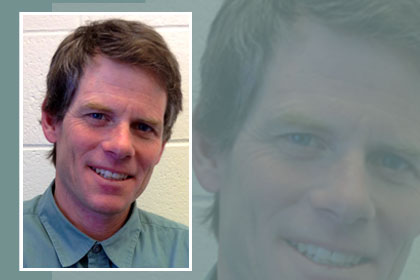
March 30, 2022
New research from Matthew Rand, Ph.D., a member of the NIEHS-funded Environmental Health Sciences Center (EHSC) at the University of Rochester, sheds light on how methylmercury exposure affects the musculoskeletal system. Rand’s findings suggest that exposure may disrupt early development of the connections between muscles and the brain, which could lead to motor control problems later in life. Rand is also collaborating with other EHSC members to translate results from his mechanistic research into information that is applicable to how methylmercury affects humans. “This type of translational environmental health science is what makes significant advances happen, and it is made possible through our unique collaborative environment as well as the cores and facilities supported by NIEHS,” said EHSC Director B. Paige Lawrence, Ph.D.- Science Highlights
- NIEHS Environmental Factor
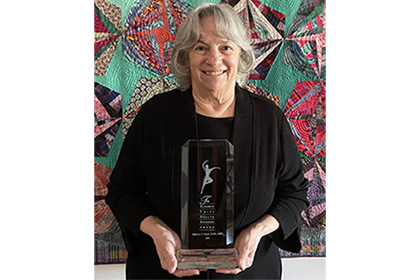
March 24, 2022
Health equity advocate Barbara Israel, Dr.P.H., was awarded the 2022 Elizabeth Fries Health Education Award by the CDC Foundation. The award recognizes a health educator who has made a substantial contribution to advancing the field of health education or health promotion through research, program development, or program delivery. Israel, who co-leads the community engagement core of the NIEHS-funded Lifestage Exposures and Adult Disease Center at the University of Michigan, was recognized for her work with the Detroit Urban Research Center and other community-based groups to address a range of environmental health issues affecting Michigan residents.- Awards
- CDC Foundation

March 22, 2022
A webinar series showcasing the research and accomplishments of early-stage investigators from all 26 NIEHS Environmental Health Sciences (EHS) Core Centers launched January 12. “We take career development and providing resources for early-stage investigators very seriously,” said Claudia Thompson, Ph.D., EHS Core Center Program director. “Supporting them is a central part of what we try to do within the Core Centers program, and through these webinars, we hope to foster cross-center collaborations and networking.” In the inaugural session, Cetewayo Rashid, Ph.D., an assistant professor at the University of Kentucky, discussed his research into the health effects of an organophosphate flame retardant. He is affiliated with the university’s Center for Appalachian Research in Environmental Sciences. Joseph Romano, Ph.D., a postdoctoral researcher at the University of Pennsylvania, shared his work to advance toxicological research through artificial intelligence. He is affiliated with the university’s Center of Excellence in Environmental Toxicology. Check out and register for future webinars at the Early Stage Investigator Spotlight Webinar Series webpage.- Career Development
- NIEHS Environmental Factor

March 01, 2022
Researchers from the University of Pennsylvania’s NIEHS-funded Center of Excellence in Environmental Toxicology developed an index to predict risk of lead exposure. The index is unique in that it considers socioeconomic and demographic factors in addition to environmental lead levels. “Our Lead Index helps to identify those with the greatest socioeconomic inequities who are also at highest risk of exposure to lead,” said Marilyn Howarth, M.D., who directs the Center’s Community Engagement Core. To determine lead levels throughout Philadelphia, researchers analyzed soil samples – including some collected by students and other community members. “Students and residents who are engaged through citizen science develop a deeper understanding of the hazards of lead in soil in their yards,” said Center researcher Richard Pepino, M.S.S., M.S. “When the effects feel personal, people are more determined to reduce their risk of harmful environmental exposures.”- Community Engagement
- NIEHS Partnerships for Environmental Public Health

February 28, 2022
In an NIEHS podcast, Megan Herting, Ph.D., discussed her research showing that children from neighborhoods characterized by poverty and unemployment had declines in cognitive performance and even brain size compared to kids from wealthier neighborhoods. Herting, who is a member of the NIEHS-funded Southern California Environmental Health Science Center at the University of Southern California, talked about why neighborhood quality matters when it comes to brain development and shared how we can promote neighborhood equity to improve children’s health.- News
- NIEHS Partnerships for Environmental Public Health

February 14, 2022
Environmental Health Sciences Core Center (EHS Core Center) researchers stood out at a December 2021 webinar focused on wastewater-based epidemiology. This wastewater surveillance approach provides a noninvasive, cost-effective way to track COVID-19 prevalence and spread in populations. Katrina Korfmacher, Ph.D., of the University of Rochester EHS Core Center, noted that at the start of the pandemic, historically disadvantaged communities in upstate New York were disproportionately affected by the virus. “We thought wastewater monitoring in communities with low testing rates could counteract inequities in the pandemic response by determining where resources were needed,” said Korfmacher, who directs the Center’s Community Engagement Core. James Keck, M.D., a member of the University of Kentucky EHS Core Center, spoke about a project exploring the feasibility of wastewater surveillance in rural populations where clinical testing is limited. “By sampling populations, wastewater-based epidemiology complements individual clinical testing,” noted Keck. “We don’t rely on people either choosing to get tested or having access to testing, so we aren’t missing pockets of the community.” To learn more about EHS Core Center efforts using wastewater-based epidemiology to bolster COVID-19 surveillance, read this July 2021 Center Spotlight Story and listen to this December 2021 podcast featuring Korfmacher.- Science Highlights
- NIEHS Environmental Factor

February 08, 2022
NIEHS-funded researchers reported that exposure to phthalates may be associated with increased mortality among U.S. adults. Leonardo Trasande, M.D., director of the NIEHS-funded Center for the Investigation of Environmental Hazards at New York University, led the study, which was selected as a January 2022 NIEHS Extramural Paper of the Month. Phthalates are chemicals found in many consumer products, particularly plastic food packaging and scented personal care products and cleaners. The researchers found that phthalate exposure may contribute to more than 90,000 premature deaths a year among people aged 55 to 64. They estimated those deaths could cost the U.S. up to $47 billion each year in lost economic productivity. According to the authors, study results demonstrate that there is an urgent need for strategies to reduce exposures to these harmful contaminants.- Publications
- NIEHS Environmental Factor
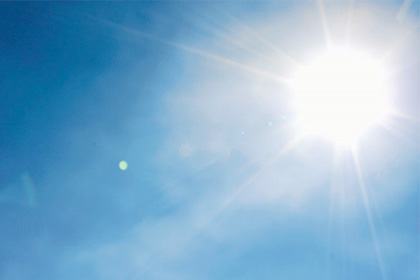
January 14, 2022
Sunscreen that includes zinc oxide, a common ingredient, may lose much of its effectiveness and become toxic after two hours of exposure to ultraviolet (UV) radiation, according to a study led by Robyn Tanguay, Ph.D. Tanguay directs the NIEHS-funded Environmental Health Sciences Core Center at Oregon State University. “Sunscreens are important consumer products that help to reduce UV exposures and thus skin cancer, but we do not know if the use of some sunscreen formulations may have unintended toxicity because of interactions between some ingredients and UV light,” said Tanguay.- Publications
- Oregon State University News
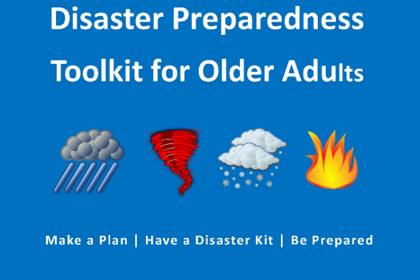
January 11, 2022
Members of the NIEHS-funded University of Kentucky Center for Appalachian Research in Environmental Sciences (UK-CARES) worked with community partners to develop a toolkit to help older adults prepare for disasters. The toolkit contains several handy documents including a disaster kit checklist, tools to document medical needs and health issues, a family communication plan, and a brief video made especially for seniors. “Our Appalachian residents can experience extreme hardship during these disasters,” said Erin Haynes, Dr.P.H., UK-CARES deputy director. “This project utilizes combined expertise and resources from across the Commonwealth to help Kentuckians who are most at need when disaster strikes.”- Community Engagement
- UK-CARES

January 04, 2022
An eye-catching infographic teaches clinicians and the public about the health impacts of extreme heat. Local high school students translated the resource into Chinese – it is also available in Spanish. The effort was funded by the Environmental Research and Translation for Health Center at University of California, San Francisco.- Community Engagement
- UCSF Environmental Research and Translation for Health Center
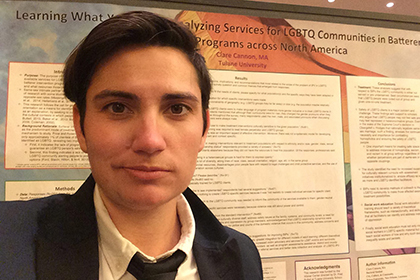
December 09, 2021
A documentary titled “Air, Water, Blood: The Power of Community-engaged Research,” funded through an NIEHS grant, features the work of Clare Cannon, Ph.D. She uses a community-based participatory research approach to address environmental health concerns of residents living in Kettleman City, California. The film shows how Cannon and her partners in the community brought attention to the potential negative health effects of a hazardous waste landfill located in the majority Latino, primarily Spanish-speaking town. The documentary was broadcast at the American Public Health Association Public Health Film Festival October 24 – 27. Cannon’s work was supported through a pilot grant from the NIEHS-funded Environmental Health Sciences Center at the University of California, Davis (UC Davis). A sociologist by training, Cannon tapped the expertise of researchers from other disciplines at the UC Davis Environmental Exposure Core. They identified pollutants in the town’s air, analyzed residential water for benzene and arsenic, and tested blood samples from community participants for polychlorinated biphenyls. “Centers like the one at Davis really matter,” said Cannon. “Without linking partners, researchers, expertise, and the equipment of core investigators, this work can’t happen. Our transdisciplinary approach will become increasingly important to protect vulnerable communities experiencing environmental injustice, particularly as we see more climate change effects.” Learn more about the project in the December 2021 Environmental Factor article.- Community Engagement
- NIEHS Environmental Factor

November 16, 2021
Ellen J. Hahn, Ph.D., R.N., FAAN, received the prestigious 2021 Faye Glenn Abdellah Leadership Award, Oct. 6, from the Friends of the National Institute of Nursing Research. Hahn, who directs the NIEHS-funded University of Kentucky Center for Appalachian Research in Environmental Sciences, conducts community-engaged research in rural Kentucky to reduce lung cancer risk related to co-exposures of tobacco smoke and radon.- Awards
- UK-CARES

November 03, 2021
Exposure to per- and polyfluoroalkyl substances (PFAS) may increase risk of type 2 diabetes in Latina girls, according to new research led by Leda Chatzi, M.D., Ph.D., deputy director of the NIEHS-funded Southern California Environmental Health Sciences Center. “Type 2 diabetes is potentially preventable, and one key area of focus should be environmental influences,” said Chatzi.- Publications
- NIEHS Environmental Factor
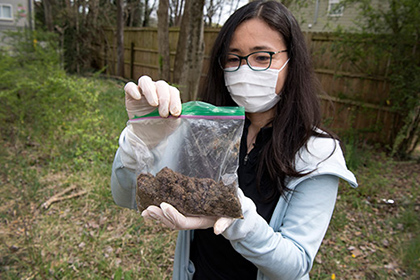
November 03, 2021
With funding from the U.S. Environmental Protection Agency (EPA), Emory University researchers will work with members of the West Atlanta community to better understand children’s exposures to lead and other environmental chemicals. Led by HERCULES Exposome Research Center members Eri Saikawa, Ph.D., and Dana Boyd Barr, Ph.D., the team will analyze environmental samples, such as soil and house dust, and biological samples from children, such as blood, to identify exposure risks in the area. They will also develop strategies to reduce harmful exposures among the children. “A key part of this project is strong engagement with the community,” said Saikawa. The researchers will work with residents to learn their needs and concerns and communicate findings as the project proceeds. The project grew out of a community-based pilot study funded by the HERCULES Center in which Saikawa and team discovered high lead levels in the soil of some West Atlanta residences.- Community Engagement
- Emory News

October 01, 2021
The NIEHS-funded Center for Urban Responses to Environmental Stressors (CURES) Community Engagement Core (CEC) at Wayne State University has a history of engaging about 500 Detroit residents annually in face-to-face events to disseminate information about environmental health science.- Community Engagement
- Wayne State University

September 22, 2021
The University of Southern California Environmental Health Centers and the Urban and Environmental Policy Institute at Occidental College are working with community health workers, also known as promotoras, to: Document health disparities. Build a community-driven environmental research agenda. Address neighborhood-level concerns in south Los Angeles. This public health-centered approach enhances promotora understanding of the research process to achieve health equity and inform social justice. Promotoras receive training in human subject protections, survey administration, physiological measurements, and sample collection for biomonitoring of environmental exposures. The promotoras leverage their trusted partnerships and apply this knowledge within their communities. As such, the promotoras provide a vital link in community-directed data collection and dissemination of public health information. They help ensure that community members are engaged and represented in health studies and have access to health intervention resources.- Community Engagement
- USC Environmental Health Centers
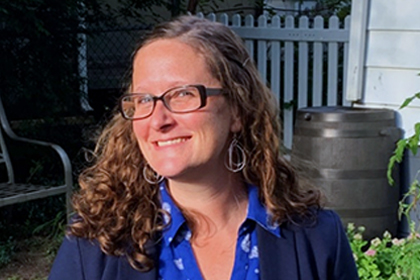
September 21, 2021
Natalie Sampson, Ph.D., works with communities and local government in Southeast Michigan to plan and evaluate program, policy, and land-use interventions to improve health equity. Sampson is a co-leader of the Community Engagement Core at the Michigan Center on Lifestage Environmental Exposures and Disease (M-LEEaD). The center facilitates multi-directional interaction between center researchers, policy makers, and communities. Read more about her work on social and environmental determinants of health, as well as the Environmental Health Research-to-Action Youth Academy that builds intergenerational capacity in community science and policy advocacy to address environment racism.- Community Engagement
- Michigan Center on Lifestage Environmental Exposures and Disease (M-LEEaD)

September 21, 2021
Luz Huntington-Moskos, Ph.D., is empowering youth to positively impact their communities with the Community Engagement Core at University of Louisville’s Center for Integrative Environmental Health Sciences. As the Community Engagement Core director, she aims to improve environmental health literacy across western Kentucky including the Louisville area. She tailors communication methods to specific communities and promotes the relevance of center resources to community environmental health. Read how Huntington-Moskos works to make science available and accessible through effective communication and youth engagement in western Kentucky communities.- Community Engagement
- University of Louisville’s Center for Integrative Environmental Health Sciences

July 13, 2021
As COVID-19 spreads, multiple NIEHS-supported researchers have been tracking and mitigating infections using wastewater-based epidemiology. NIEHS-funded researchers are using this methodology to trace and reduce COVID-19 exposures on campuses, nursing homes, and rural areas.- Community Engagement
- NIEHS

April 02, 2021
Anjum Hajat, Ph.D. investigates the intersection of air pollution and psychosocial stressors, and how they affect health outcomes. Her research suggests that individuals who suffer from stressors, such as poverty and neighborhood disadvantage, in conjunction with air pollution exposure, have more adverse health outcomes, such as cardiovascular disease.- Science Highlights
- University of Washington Center for Exposures, Diseases, Genomics, and Environment (EDGE)
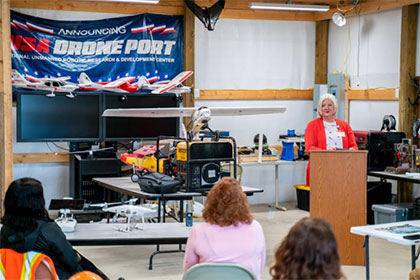
March 09, 2021
Through a Rapid Response Mini-Grant for COVID-19, the Community Engagement Core at the University of Kentucky Center for Appalachian Research in Environmental Sciences (UK-CARES) is testing the use of drones to deliver personal protective equipment to high-risk Appalachia communities. This collaborative pilot project unites drone pilots with community health workers to assist the Kentucky River District’s most vulnerable community members who are isolated during the pandemic. If successful, this project could bridge the supply gap rural communities are facing during the COVID-19 pandemic as well as streamline the way environmental sampling is conducted for future environmental health studies.- News
- University of Kentucky Center for Appalachian Research in Environmental Sciences

February 08, 2021
Since we last caught up with Melissa Smarr, Ph.D., at the HERCULES Center, she has become a health scientist administrator for the NIEHS Population Health Branch of the Division of Extramural Research and Training. Smarr says she has been interested in the various aspects of research administration since she was doctoral student. Her current position provides opportunity to address emerging areas of research from a broader perspective. Smarr also noted that science communication is an exciting part of her research journey.- Career Development
- NIEHS

November 12, 2020
Timothy Moran, M.D., Ph.D., is investigating the role of environmental factors in food allergy development. His research suggests that food allergies may be caused in part by environmental exposures, rather than purely by genetics. His research centers on the question of whether there is a difference in the indoor environment of children with peanut allergies and the indoor environment of those without a peanut allergy.- Science Highlights
- UNC Center for Environmental Health and Susceptibility

March 30, 2020
Anna Goodman Hoover, Ph.D., is assessing Appalachian Kentuckians’ water-related environmental health literacy. She says that providing residents with useful information to protect their health first requires understanding their knowledge and perceptions of water-related issues. The project is supported by a pilot grant from the University of Kentucky Center for Appalachian Research in Environmental Sciences (UK-CARES), which is funded by NIEHS.- Career Development
- UK-CARES

March 25, 2020
Melissa Smarr, Ph.D., was featured in Pediatrics Research for her work examining the effects of acetaminophen use during pregnancy on fetal growth. Her study is the first to investigate this link. Smarr is a member of the NIEHS-funded HERCULES Exposome Research Center at Emory University.- Career Development
- HERCULES Exposome Research Center
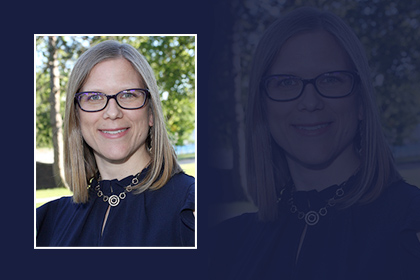
February 04, 2020
Lauren Petrick, Ph.D., identifies how molecular signatures in the body can tell a more complete story about prenatal and neonatal chemical exposures. She is a member of the NIEHS-funded Mount Sinai Transdisciplinary Center on Early Environmental Exposures.- Career Development
- Mount Sinai Transdisciplinary Center on Early Environmental Exposures

December 17, 2019
Led by NIEHS grantee Kathleen Vandiver, Ph.D., a team of environmental advocates, community leaders, and government officials will create a public space along the Malden River in Massachusetts to improve community health and recreation opportunities. The effort is funded by the Norman B. Leventhal City Prize.- Awards
- Massachusetts Institute of Technology Center for Environmental Health Sciences

November 22, 2019
Marti Lindsey, Ph.D., was named the Michael A. Cusanovich Arizona Bioscience Educator of the Year, an award honoring educators who demonstrate leadership and creativity to engage students in life sciences. Lindsey ’s work spans more than 18 years at the University of Arizona (UAZ), where she directs the Community Engagement Core in the Southwest Environmental Health Sciences Center.- Awards
- UAZ Southwest Environmental Health Sciences Center

October 26, 2019
University of Rochester Environmental Health Sciences Center members Daniel Croft, M.D., M.P.H., and Irfan Rahman, Ph.D., were featured on a Today Show segment about vaping-related lung injury. In the segment, Rahman is shown working in his lab while Croft discussed the symptoms associated with this condition. Rahman uses cell, mouse, and human studies to investigate how flavoring chemicals used in vaping devices affect lung health. He also analyzes vaping liquid collected from patients and hospitals around the world to better understand its chemical makeup. Croft, a clinician researcher who focuses on inhalation toxicology, helps interpret the clinical relevance of findings from the lab and collaborates on a study to better understand respiratory effects in people who vape.- News
- University of Rochester Environmental Health Sciences Center
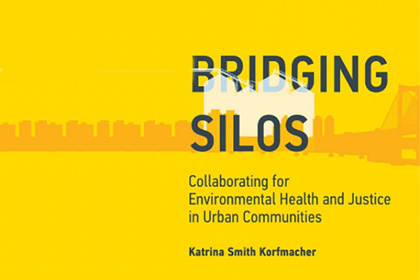
October 24, 2019
A new book, “Bridging Silos: Collaborating for Environmental Health and Justice in Urban Communities,” examines ways that community groups, government agencies, academic institutions, and private institutions can collaborate to address environmental health disparities. Written by Katrina Smith Korfmacher, Ph.D., of the University of Rochester Environmental Health Sciences Center, the book presents in-depth studies of three efforts to address long-standing environmental health issues: childhood lead poisoning in Rochester, New York; unhealthy built environments in Duluth, Minnesota; and pollution related to commercial ports and international trade in Southern California. The book is available for free download through MIT Press's Open Access initiative.- Publications
- University of Rochester Environmental Health Sciences Center

October 01, 2019
Emory University’s HERCULES Exposome Research Center funded a community-engaged study to investigate urban soil contamination in Atlanta, Georgia. The study led to an U.S. Environmental Protection Agency site investigation. This outcome shows how engaging communities in studies may strengthen science and expand its impact.- Community Engagement
- Emory University HERCULES Exposome Research Center

September 17, 2019
John Meeker, Sc.D., talks about food as a source of exposure to perfluoroalkyl and polyfluoroalkyl substances (PFAS) on Issues of the Environment, a weekly radio segment on Eastern Michigan’s National Public Radio (NPR) station. Meeker is deputy director of the Core Center at the University of Michigan (UM) and a project leader at the UM Children's Environmental Health Center.- News
- Michigan Center on Lifestage Environmental Exposures and Disease (M-LEEaD)

August 30, 2019
On a local TV news segment, scientists with the University of California, Davis Core Center discuss their research to examine the health effects of the 2018 Camp Fire. The segment features Center Director, Irva Hertz-Picciotto, Ph.D., who studies the long-term health effects of wildfires, and center member Rebecca Schmidt, Ph.D., who studies how exposures from the wildfire may affect the health of pregnant women and their babies.- News
- Fox 40

August 13, 2019
University of Cincinnati (UC) researchers discovered that an enzyme involved in repairing damaged DNA also reduced the development of liver tumors in mice. Study results may help scientists develop new ways to treat liver cancer, the fourth leading cause of cancer deaths worldwide.- Publications
- UC Center for Environmental Genetics
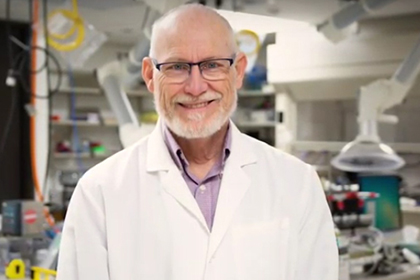
June 07, 2019
In a one-minute video, Peter Thorne, Ph.D., director of the Environmental Health Sciences Research Center (EHSRC) at the University of Iowa, talks about how a new state-of-the-art lab will advance Center research and facilitate scientific collaboration.- News
- University of Iowa EHSRC

June 04, 2019
Gail Garbowski, administrator of the Columbia University Center for Environmental Health in Northern Manhattan (CEHNM), is featured in a news story highlighting her four decades of work at Columbia University – including 22 years with the CEHNM. As CEHNM administrator, Garbowski organizes events, monitors the budget, prepares grant reports, and translates Center research findings so they can be understood by community members.- News
- Columbia University CEHNM

May 24, 2019
A new video highlights research while urging caution regarding the use of e-cigarettes and vaping. Produced by the University of North Carolina at Chapel Hill (UNC) Center for Environmental Health and Susceptibility (CEHS), the video opens with striking historical footage showing doctors recommending specific brands of cigarettes. The message – let’s learn from history. Research is suggesting that we should be cautious in our approach to vaping and that it might not be as safe as we think.- News
- UNC Center for Environmental Health and Susceptibility

May 15, 2019
Tamarra James-Todd, Ph.D., investigates how exposure to environmental factors, such as hormone-disrupting chemicals, might change mothers’ heart and metabolic health during pregnancy and contribute to disease later in life.- Career Development
- Harvard Chan-NIEHS Center for Environmental Health
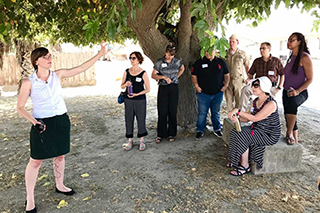
May 02, 2019
A new documentary provides a firsthand look at a tour of communities affected by industrial development in California’s San Joaquin Valley. The tour was organized by members of the Environmental Health Sciences Center at the University of California, Davis.- News
- UC Davis Environmental Health Sciences Center

May 02, 2019
The American Thoracic Society (ATS) designated Irfan Rahman, Ph.D., an ATS Fellow for his research on chronic lung inflammatory diseases. Rahman is a member of the University of Rochester Medical Center (URMC) Environmental Health Sciences Center.- Career Development
- URMC Environmental Health Sciences Center
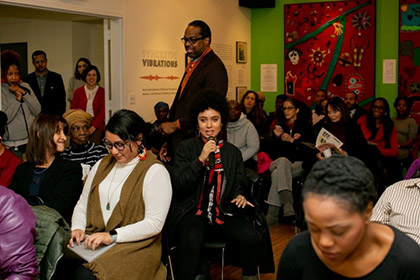
April 12, 2019
Nearly 50 community members met with staff from Columbia University and WE ACT for Environmental Justice to learn about possible health risks from harmful chemicals found in cosmetics and personal care products.- Community Engagement
- Columbia Center for Environmental Health in Northern Manhattan

April 03, 2019
The American Cancer Society awarded Scott Langevin, Ph.D., a $782,000 grant for his research using a mouth rinse test to detect mouth and throat cancers in their earliest stages. He credits his early career support from the University of Cincinnati (UC) Center for Environmental Genetics (CEG) for helping him get the grant.- Career Development
- UC Center for Environmental Genetics

March 25, 2019
The American Thoracic Society (ATS) awarded Daniel Croft, M.D., the David Bates Award for the best submitted abstract in the field of environmental or occupational health at the ATS 2018 International Conference. Croft is a member of the University of Rochester Medical Center (URMC) Environmental Health Sciences Center.- Awards
- URMC Environmental Health Sciences Center

March 25, 2019
Researchers from Emory University are investigating what traffic-related air pollutants people are exposed to and the health effects that might occur as a result.- Science Highlights
- HERCULES Exposome Research Center

February 06, 2019
Marissa Sobolewski, Ph.D., is an assistant professor and toxicologist at the University of Rochester Medical Center (URMC). She says the URMC Environmental Health Sciences Center has been influential in her transition into the field of environmental health science.- Career Development
- URMC Environmental Health Sciences Center

December 18, 2018
Robert Blount, M.D., a physician scientist at the University of Iowa Environmental Health Sciences Research Center (EHSRC), studies how exposure to air pollution affects tuberculosis risk and the body’s immune response to the lung infection.- Career Development
- University of Iowa EHSRC

November 26, 2018
Brandon Pearson, Ph.D., studies the role genetic, epigenetic, and environmental factors play in the development of brain disorders at the Center for Environmental Health in Northern Manhattan (CEHNM) at Columbia University.- Career Development
- Columbia University CEHNM
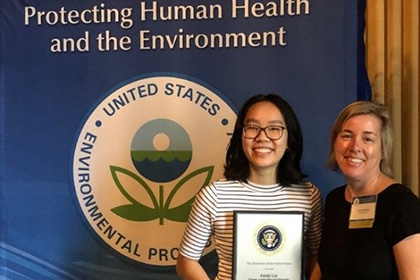
November 14, 2018
High school senior Emily Liu was awarded the President’s Environmental Youth Award from the U.S. Environmental Protection Agency for her project focused on air quality and renewable energy. Liu’s project was inspired by her involvement in the Climate Leadership and Energy Awareness Program (Climate LEAP), which is funded in part by the Center for Environmental Health and Susceptibility (CEHS) at the University of North Carolina at Chapel Hill.- Awards
- UNC CEHS

November 07, 2018
Carrie Breton, Sc.D., answered questions about how exposure to air pollution during pregnancy can affect fetal development on a September 2018 episode of Science Friday.- News
- SCEHS Center
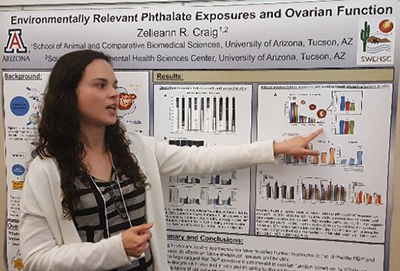
October 19, 2018
Zelieann Craig, Ph.D., is an early-stage investigator examining the effects of phthalate exposure on reproduction and infertility. She is a member of the Southwest Environmental Health Sciences Center at the University of Arizona.- Career Development
- UAZ SWEHSC
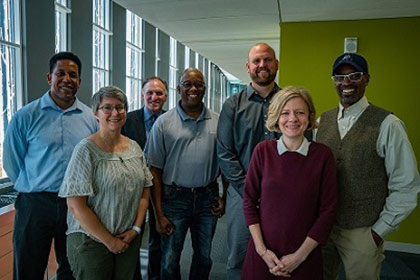
September 17, 2018
A new video highlights how NIEHS grantees are raising awareness of the environmental health issues in Detroit. The video was created by the Center for Urban Responses to Environmental Stressors (CURES) at Wayne State University.- Community Engagement
- CURES

August 22, 2018
Catherine Karr, M.D., Ph.D., is working to improve children’s health using a community engaged approach. A recent article in The Lancet lauds her for her accomplishments.- Awards
- UW EDGE Center

August 17, 2018
In a study done on the health effects of e-cigarette flavoring, researchers at the University of North Carolina at Chapel Hill (UNC) find that compounds that are safe to eat may have harmful effects on the lung’s defense system when inhaled.- Science Highlights
- UNC CEHS

August 09, 2018
Maternal exposure to chemicals used in unconventional oil and gas extraction, also known as fracking, affected immune system function in mice, according to a new study by NIEHS grantees from the University of Rochester Medical Center.- Publications
- NIEHS Paper of the Month

July 26, 2018
Grandchildren of women who used the pregnancy drug diethylstilbestrol (DES), a known endocrine disruptor, have elevated odds for attention deficit hyperactivity disorder (ADHD), according to a new study funded in part by NIEHS. The study is the first to provide evidence of the potential neurodevelopmental consequences of exposure to endocrine disruptors across generations in humans. The study was a collaborative effort involving investigators from the EHS Core Centers at Columbia University and Harvard University.- Publications
- EurekAlert!

July 26, 2018
HERCULES Center Director Gary Miller, Ph.D., answered questions about the exposome and why it matters to human health on a recent episode of Big Picture Science, a weekly radio show and podcast of the SETI Institute.- News
- HERCULES Exposome Research Center

June 04, 2018
Researchers from the North Carolina State University Center for Human Health and the Environment, identified hotspots in the human genome that are susceptible to epigenetic changes after cadmium exposure. The research provides clues about how cadmium exposure causes disease.- Publications
- NCSU Center for Human Health and the Environment

June 04, 2018
Dana Dolinoy, Ph.D., deputy director of the University of Michigan Lifestage Environmental Exposures and Disease (M-LEEaD) Center, received the 2018 Achievement Award from the Society of Toxicology (SOT) for her work to understand how nutritional and environmental factors influence epigenetic gene regulation, and how early life exposures can lead to disease later in life.- Awards
- M-LEEaD Center

June 04, 2018
Judith Zelikoff, Ph.D., received the 2018 Society of Toxicology (SOT) Education Award for her significant contributions to toxicology education. She is director of the Community Engagement Core within the New York University (NYU) Environmental Health Sciences Core Center.- Awards
- NYU Environmental Health Sciences Core Center

May 22, 2018
A team of Wayne State University (WSU) researchers have received the “AI for Earth” Azure Award from Microsoft. The award will provide WSU researchers access to innovative data science, spatial analysis, and visualization tools to examine how pollutants contaminate Michigan water supplies.- Science Highlights
- Wayne State University

May 22, 2018
University of Iowa (UI) researchers have identified a new population of lung stem cells that appear to be important for repairing the airway following severe injury. The finding may help develop treatments for airway diseases, such as asthma and cystic fibrosis. Funded in part by the UI Environmental Health Science Research Center, the research aligns with the Center’s focus on environmental lung disease. (Photo courtesy of Cell Stem Cell)- Publications
- EurekAlert! Science News

May 01, 2018
Columbia University researchers conducted interviews with New York City (NYC) building owners, policy makers, and bank lenders to shed light on why some residential buildings in Northern Manhattan continue to burn fuels that produce high levels of air pollution, despite incentives to switch to cleaner fuels. The researchers proposed greater financial incentives and other changes to the NYC Clean Heat Program to encourage more buildings to use natural gas.- Science Highlights
- EurekAlert! Science News

February 20, 2018
Researchers from North Carolina State University’s Center for Human Health and the Environment are leading a collaborative project to study GenX exposure among residents of New Hanover County, North Carolina. The community-based project will test blood, urine, and drinking water samples from 400 participants for GenX and related chemicals.- Science Highlights
- NC State News
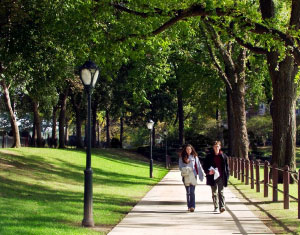
February 20, 2018
Adolescents living in areas surrounded by trees and other green vegetation have better mental health than those exposed to less greenery at home, according to new research supported in part by the EHS Core Center at Harvard University. The study is one of the first to examine the relationship between natural environments and depressive symptoms in adolescents.- Science Highlights
- Harvard University

February 20, 2018
Air pollution may cause teenage girls to have irregular menstrual cycles, according to a study funded in part through the Massachusetts Institute of Technology’s Center for EHS pilot project program. The study is the first to show that exposure to air pollution among teen girls is associated with slightly increased chances of menstrual irregularity and longer time to achieve such regularity in high school and early adulthood.- Science Highlights
- EurekAlert! Science News

February 20, 2018
Research from North Carolina State University’s Center for Human Health and the Environment suggests that prenatal exposure to flame retardant chemicals commonly used in furniture and baby products may hinder healthy brain development. The researchers found that the flame retardant chemical disrupts normal placental function in rats, leading to altered production of the neurotransmitter serotonin.- Science Highlights
- NC State News

February 20, 2018
Heidi Hsieh, Ph.D., a former doctoral student in the Center for Environmental Genetics (CEG) at the University of Cincinnati (UC), was honored with the 2017 Early Career Professional Award from the American College of Toxicology. While at UC, Hsieh worked with CEG member Mary Beth Genter, Ph.D., to examine the mechanism of zinc toxicity in olfactory neurons. She is now a study director at Covance Laboratories, Inc. in Madison, Wisconsin.- Awards
- University of Cincinnati

November 09, 2017
NIEHS grantee Joel Kaufman, M.D., is lead author of the best environmental epidemiology paper published in 2016, according to the International Society for Environmental Epidemiology (ISEE). The study shared significant findings from the Multi-Ethnic Study of Atherosclerosis and Air Pollution (MESA Air) about how exposure to air pollution can lead to cardiovascular disease. Kaufman is a member of the Interdisciplinary Center for Exposures, Diseases, Genomics and Environment (EDGE) at the University of Washington.- Awards
- University of Washington School of Public Health
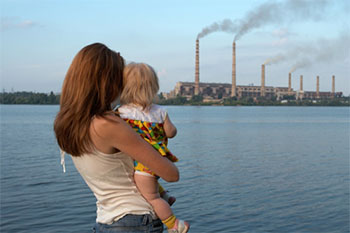
October 24, 2017
University of Cincinnati researchers found that some Mid-Ohio River Valley residents have higher amounts of the chemical polyfluorooctanoic acid (PFOA) in their bodies than most other Americans, and industrial releases to the Ohio River may be a major source of exposure.- Science Highlights
- University of Cincinnati

October 18, 2017
University of Cincinnati Community Engagement Core members provide testing kits for eastern Ohio students to collect, sample, and analyze local water.- Community Engagement
- University of Cincinnati
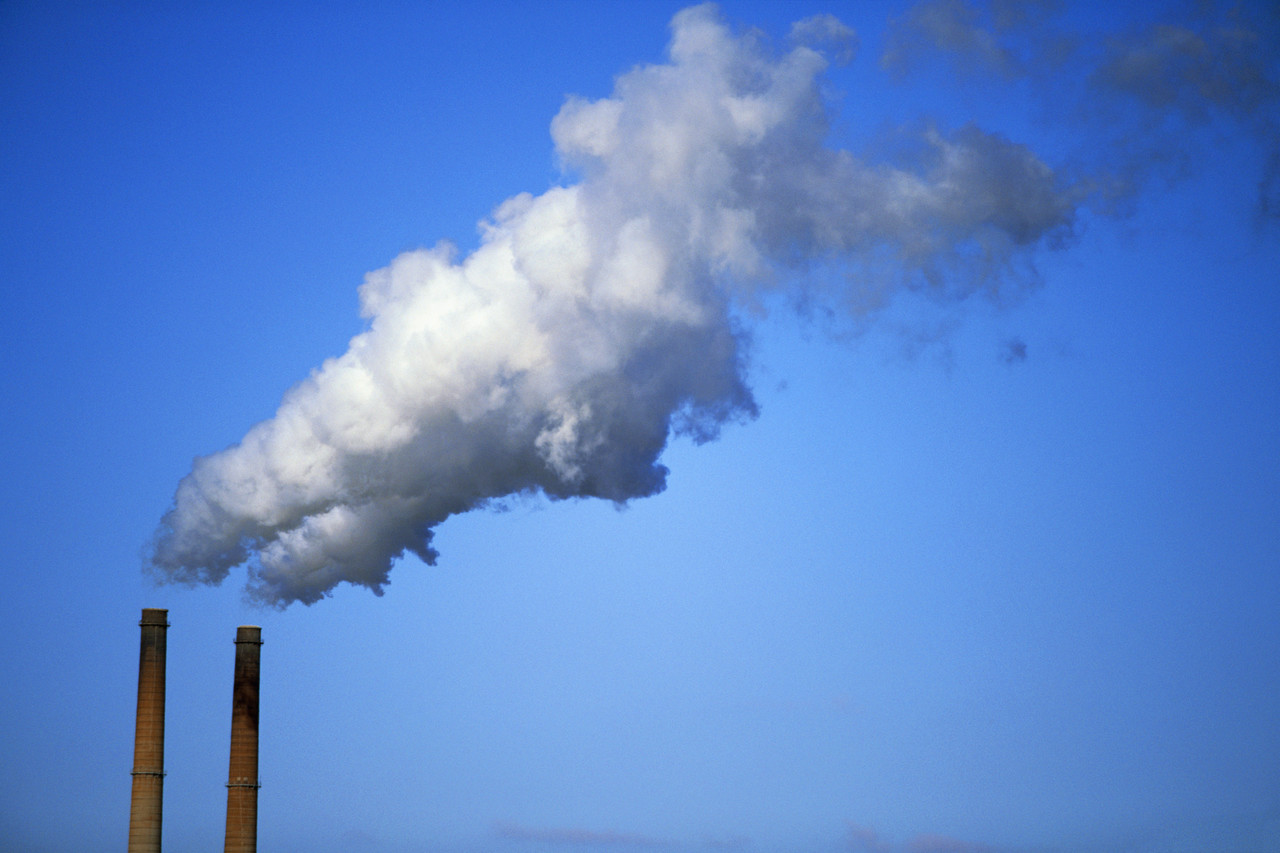
October 04, 2017
Research from the University of North Carolina at Chapel Hill EHS Core Center estimates that future climate change, if left unaddressed, will significantly increase premature deaths associated with air pollution.- Science Highlights
- University of North Carolina at Chapel Hill News

July 12, 2017
The first ever UC Davis Environmental Health Sciences Academy Day on March 21 brought together multi-disciplinary researchers and community-based organizations to discuss concerns about environmental health impacts, specifically those centered on water safety and contamination issues in the Central Valley of California.- Community Engagement
- UC Davis Environmental Health Sciences Center

July 12, 2017
Scientists have discovered how omega-3 fatty acids contained in fish oil could be used for asthma patients. The research team included members of the University of Rochester EHS Core Center.- Science Highlights
- University of Rochester Medical Center
